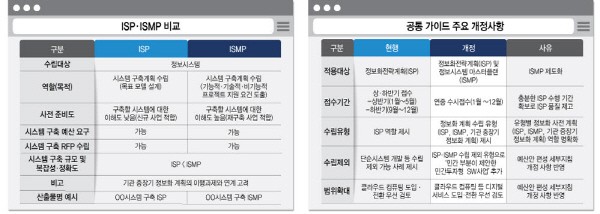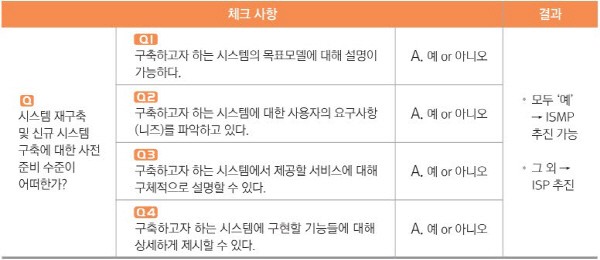Ministry of Economy and Finance·NIA's common guide revised
Strengthen specificity to reflect scale and complexity
Aiming to resolve development delay and overlapping investment
Option to choose base

The 'Information System Master Plan (ISMP)' has been institutionalized.
The goal is to improve the utilization of information systems, prevent overlapping construction, and secure investment efficiency beyond the rigid format limitations of "Information Strategy Plan (ISP)."
The Ministry of Economics and Finance and the National Information Society Agency (NIA) distributed the "Common Guide to Establishing ISPs and ISMPs (6th Edition)." It contains procedures and standards that related agencies should follow when establishing ISPs or ISMPs, based on the Ministry of Economy and Finance's "detailed guidelines for drawing up budget proposals and preparing fund management plans."
The biggest difference between the 'Common Guide to Establishing ISPs (5th Edition)' distributed last year is that the newly revised guide now includes ISMPs as well as ISPs. As a result, informatization businesses in principle must establish an 'ISP or ISMP' and apply for a budget. The common guide should be referred to, when establishing an ISP and an ISMP.
ISPs and ISMPs are identical in that their goal is to achieve informatization through the establishment of an information system. However, while ISPs focus on designing a target model for system development based on the requirements within the organization, ISMPs differs in that it derives functional, technical and non-functional project support requirements.
ISMPs are established when the understanding of the construction system is high and the scale and complexity of the project can be accurately calculated. Unlike ISPs, which write a request for proposal (RFP) again after securing budgets, ISMPs aim to establish a specific business plan with the RFP.

Securing detailed request for proposals at the planning stage can reduce unreasonable task changes and overlapping investments due to identical function and system construction. It can also prevent delays in the analysis and design phases and reduce development schedules.
The common guide specifically specified considerations for each item for comparison and review between ISPs and ISMPs, the basic composition of ISPs and ISMPs, and detailed implementation methods for each major activity. Organizations can select an ISP or ISMP after reviewing whether the system is new or rebuilt, and the level of preparation in advance.
An NIA official said, “ISMPs can design an information system with detailed functions for the specified system,” further adding, “You can choose between an ISP or an ISMP depending on the system understanding or readiness of each institution."
In addition to the institutionalization of ISMPs, the 'Common Guide to Establishing ISPs and ISMPs (6th Edition)' includes revisions such as receiving ISP and ISMP results year-round, excluding ISP and ISMP establishment for private-investment software projects, and prioritizing the introduction and conversion of digital services such as cloud computing.
In the past, ISP and ISMP results were received in the first half (January to May) and the second half (September to December). This has now been converted to a year-round application, so that ISP and ISMP periods are sufficiently secured.
Private investment type SW projects, in which the private sector invests more than 50% of the project budget and participates, allows the project to start applying for a budget without an ISP or ISMP. In the past, only businesses such as simple system development and simple purchase of goods could be exempted from ISPs. It is expected that the project period will be shortened by one to two years, which will serve as an opportunity for private investment software businesses to expand.
By Staff Reporter Ho-cheon Ahn hcan@etnews.com